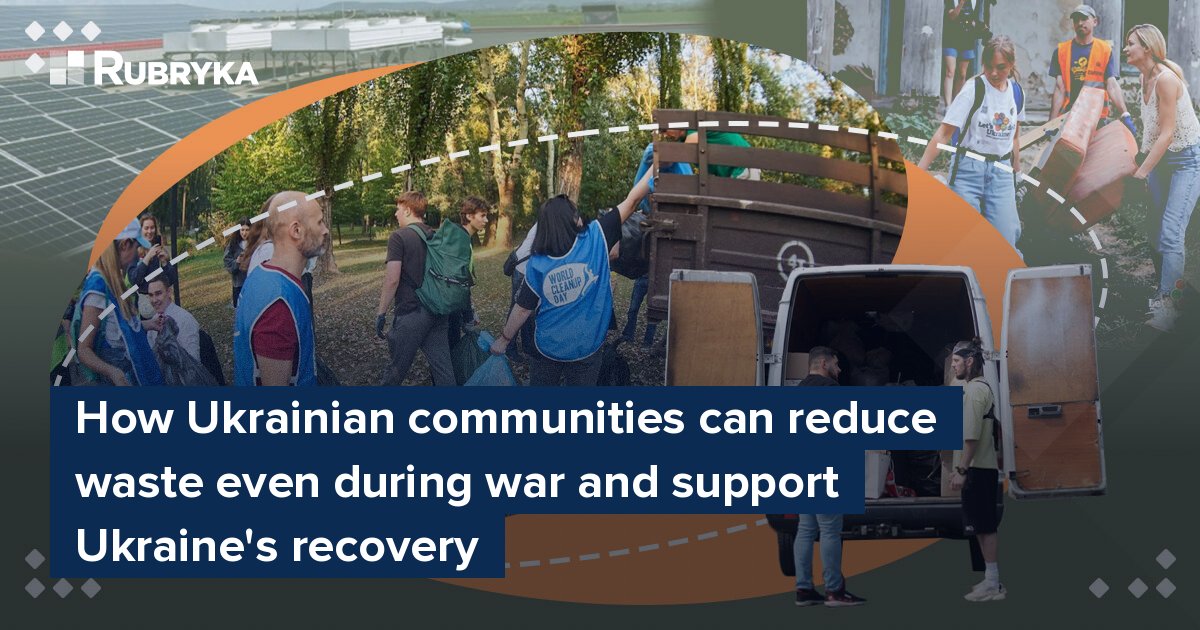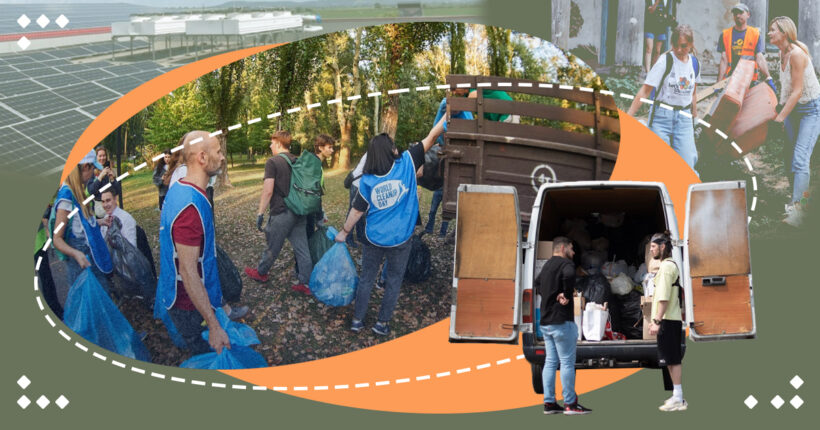
What's the problem?
10 million tons of waste
Ukraine generates over 10 million tons of waste yearly, including more than 500,000 tons of hazardous materials. Even before the war, waste management was in crisis. The law allowed companies to get licenses to collect and store dangerous waste but not necessarily to dispose of it properly. As a result, much of it was "processed" only on paper, meaning it ended up in illegal dumps or scattered in forests instead of being safely recycled.
Russia's war has made the situation even worse. Official data shows that the destruction of 94,370 units of Russian military equipment has generated over 1.4 million tons of waste and released around 130,000 tons of emissions into the air. On top of that, the widespread destruction of residential buildings, industrial sites, and infrastructure has left behind millions of tons of construction debris. Experts estimate that there are over 700,000 tons of accumulated construction waste in Ukraine's government-controlled areas alone — and the actual figure could be much higher.
Another environmental disaster is the collapse of waste collection, sorting, and recycling systems, especially in front-line and recently liberated regions. Uncollected garbage is piling up in unsafe locations, forming illegal dumps that pose serious threats to the environment and public health.
What's the solution?
Sustainable recovery
"Restoring waste collection, sorting, and recycling systems is a crucial step in Ukraine's sustainable recovery," says Yuliia Markhel, leader of Let's Do It Ukraine and founder of the international Let's Do It World movement. "Every community can contribute to this effort, even in wartime. This includes launching local waste reduction initiatives, such as setting up sorting stations in safe areas, creating community eco-spaces, or running educational campaigns on responsible waste management. These efforts not only promote environmental sustainability but also bring people together, strengthening social unity."
Sofiia Sydorenko, head of Zero Waste Alliance Ukraine, whose team has been working for years on waste prevention and resource management, agrees:
"Ukraine must develop a clear strategy for managing resources because how we handle resources directly determines how we handle waste. This needs to happen at the national level, backed by action plans. We must lay the groundwork for this vision now and base it on the principle of waste prevention."
How does it work?
Why reducing waste is part of Ukraine's recovery
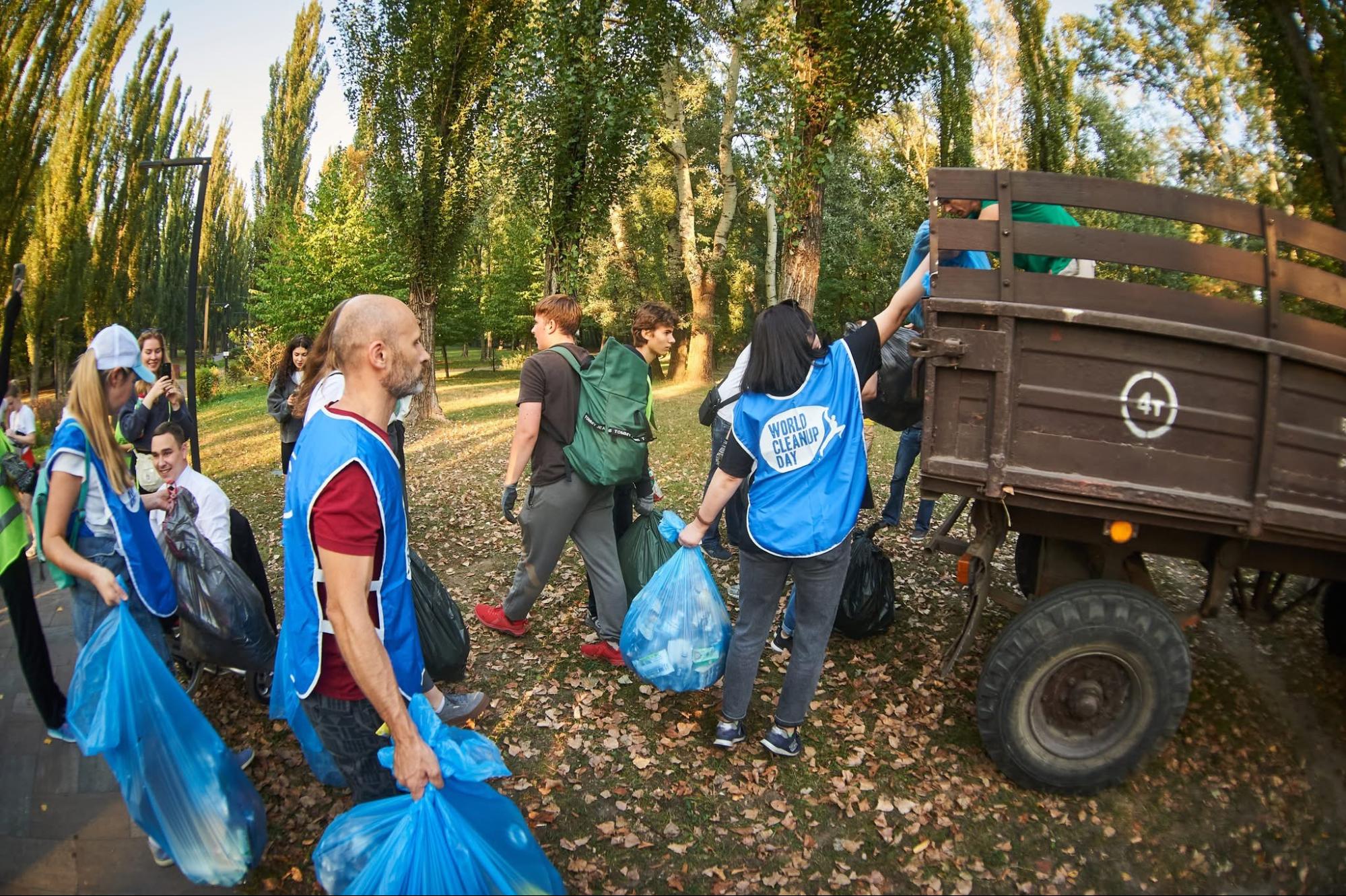
On World Cleanup Day in Kyiv, volunteers took to the streets, clearing litter and debris. Photo courtesy of Let's Do It Ukraine
Yuliia Markhel, head of Let's Do It Ukraine, believes reducing waste isn't just about helping the environment — it plays a role in rebuilding Ukraine's economy.
Recycling materials like bricks, concrete, and wood means Ukraine doesn't have to use as many new resources to rebuild infrastructure. It also saves energy that would otherwise go into producing new materials and helps cut air, water, and soil pollution. Beyond that, developing recycling industries and reuse programs can boost the economy, create jobs, and support local communities.
Sofiia Sydorenko, head of Zero Waste Alliance Ukraine, agrees.
"Waste management is an all-encompassing issue. We need to rethink how we use resources altogether," Sydorenko says. "Our system has to change so that we stop wasting the planet's already limited resources."
Sydorenko also points out that proper waste management can help reduce dependence on fossil fuels, often supplied by aggressor states.
What can communities do?
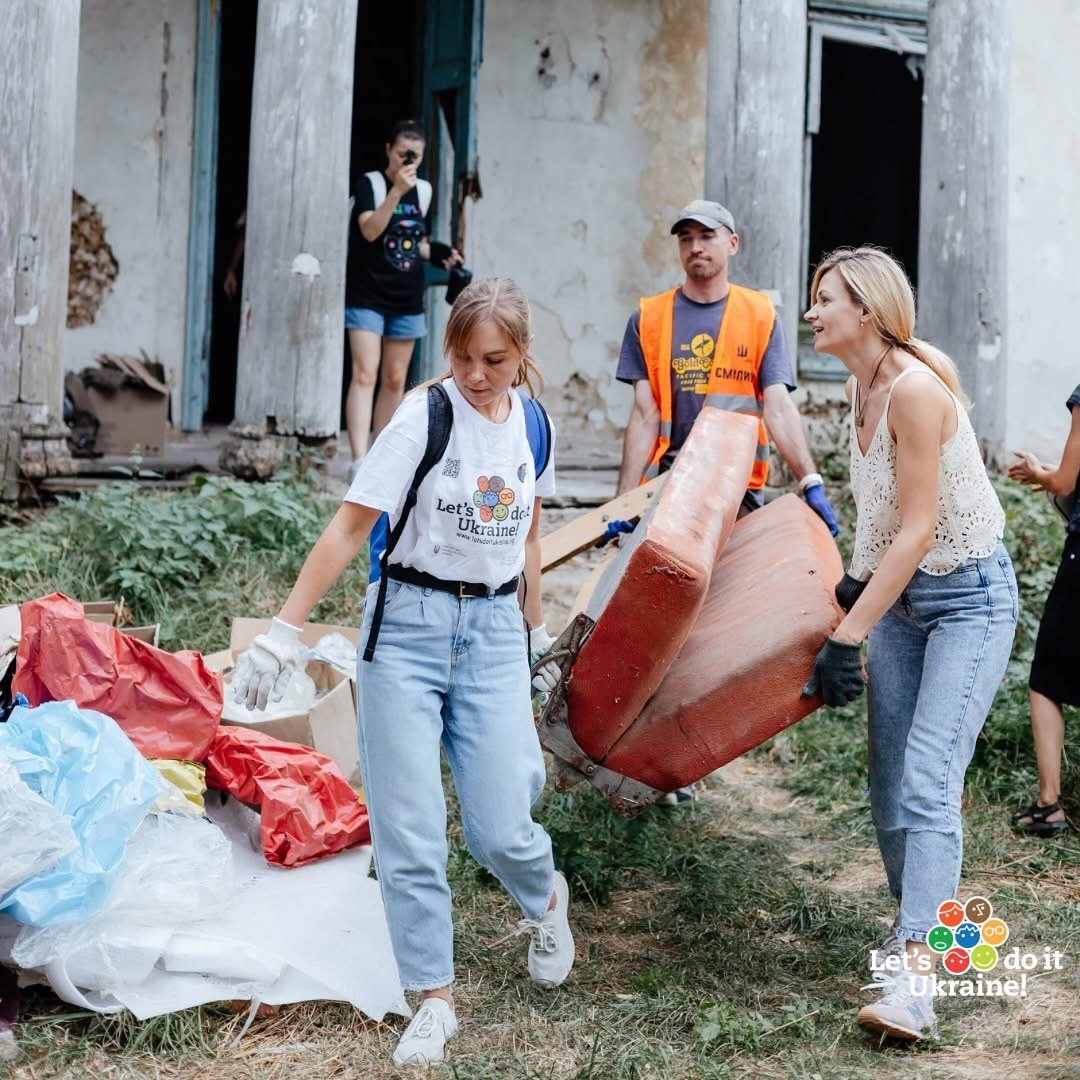
Volunteers gathered for a community clean-up project at the Cossack estate "Pokorshchyna" in the Chernihiv region. Photo courtesy of Let's Do It Ukraine
Communities are at the heart of Ukraine's waste reduction, even during war. Experts from Let's Do It Ukraine and Zero Waste Alliance Ukraine suggest these steps:
1. Setting up recycling and waste sorting
The first step is to create drop-off points for recyclables and ensure people know what they can bring. The next step is smarter shopping — choosing products in recyclable packaging and ensuring they end up at the right collection site.
A handy tool for this is the National Map of Recycling Collection Points, which helps people find the nearest recycling location.
Why it matters:
- Sorting waste keeps valuable materials (plastic, metal, glass, paper) out of landfills to be reused.
- Separating organic waste can reduce landfill waste by 30–60%, cutting fuel costs for waste transport.
- Keeping organic waste separate also prevents contamination, making recyclables more valuable. This means municipalities can sell them and reinvest the money into community projects.
How to make it happen: Even in wartime, communities can install separate waste bins in safe locations. They should also explain the benefits of sorting waste to locals through social media, flyers, and public announcements.
2. Creating drop-off points for hazardous waste
Some types of waste require special handling. Communities can set up collection centers for batteries, light bulbs, electronics, and construction debris (especially from war-damaged buildings).
Why it matters: Proper disposal of these materials prevents toxic chemicals and heavy metals from polluting the environment.
How to make it happen: Communities can work with local governments, volunteer groups, or businesses licensed to collect and recycle hazardous waste. International donors may also help fund these efforts.
3. Promoting composting
Why it matters: Turning food scraps and yard waste into compost reduces landfill waste and creates natural fertilizer for parks, gardens, and community green spaces.
How to make it happen: Communities can set up composting sites in shared courtyards, housing associations, or municipal properties. They can also teach residents how to sort and compost properly.
4. Encouraging reuse and repair
Clothing, furniture, and electronics shouldn't end up in landfills if they can be fixed or reused. This is especially crucial during wartime when resources are limited, and many displaced people need basic items.
How to make it happen: Communities can launch or support:
- Repair workshops to fix household items.
- Swap centers where people donate usable goods to those in need.
- Eco-markets and repair masterclasses teach people how to fix things instead of throwing them away.
5. Supporting local recycling businesses
Local recycling companies can respond faster to community needs, accepting various waste and introducing new recycling technologies. This will ensure valuable materials are used effectively, reduce time spent on logistics and transport costs, and cut CO₂ emissions. Supporting them also helps create jobs, boost tax revenue, and strengthen the local economy.
How to make it happen:
- Prioritize local recyclers when signing contracts for waste collection and processing.
- Provide land or incentives (like grants or tax breaks) to help recycling businesses expand.
6. Raising awareness and working together
Waste reduction won't happen if people don't understand why it matters — especially during wartime.
How to make it happen: Organize community meetings, webinars, and workshops to explain the benefits of waste reduction. Work with schools, libraries, and volunteer groups to spread awareness — partner with influencers, religious leaders, and youth organizations to reach more people.
Where in Ukraine do eco-solutions work?
Lviv: composting and educational initiatives
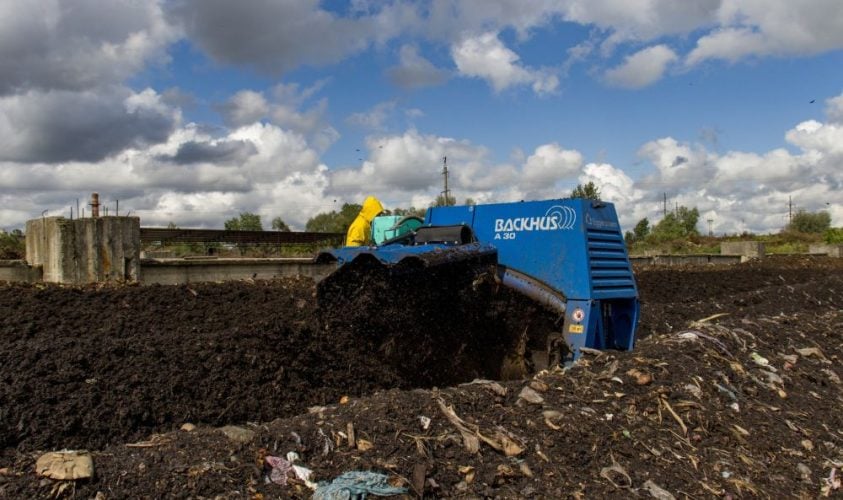
City composting station in Lviv. Photo: Lviv City Council
Lviv has developed a system for collecting and processing organic waste, including a city-wide composting station — an example of centralized composting projects in Ukraine. Special containers for organic waste have been placed in different neighborhoods, and the collected material is sent for composting. Zero Waste Lviv supports residents by organizing educational events and guiding them through waste sorting and reduction, encouraging an eco-conscious mindset.
Slavutych: cutting CO₂ emissions
In the summer of 2024, Slavutych hosted a seminar for energy managers. The city's first deputy mayor, Viktor Shevchenko, presented an action plan to reduce CO₂ emissions by over 58%, improve energy efficiency, and increase the use of renewable energy. The plan includes thermal modernization of public buildings, upgrading network pumps, and installing solar power stations for hospitals and heating systems. These projects will be funded through grants and partial co-financing from the city budget.
Odesa: Eco-Route and Eco-Taxi
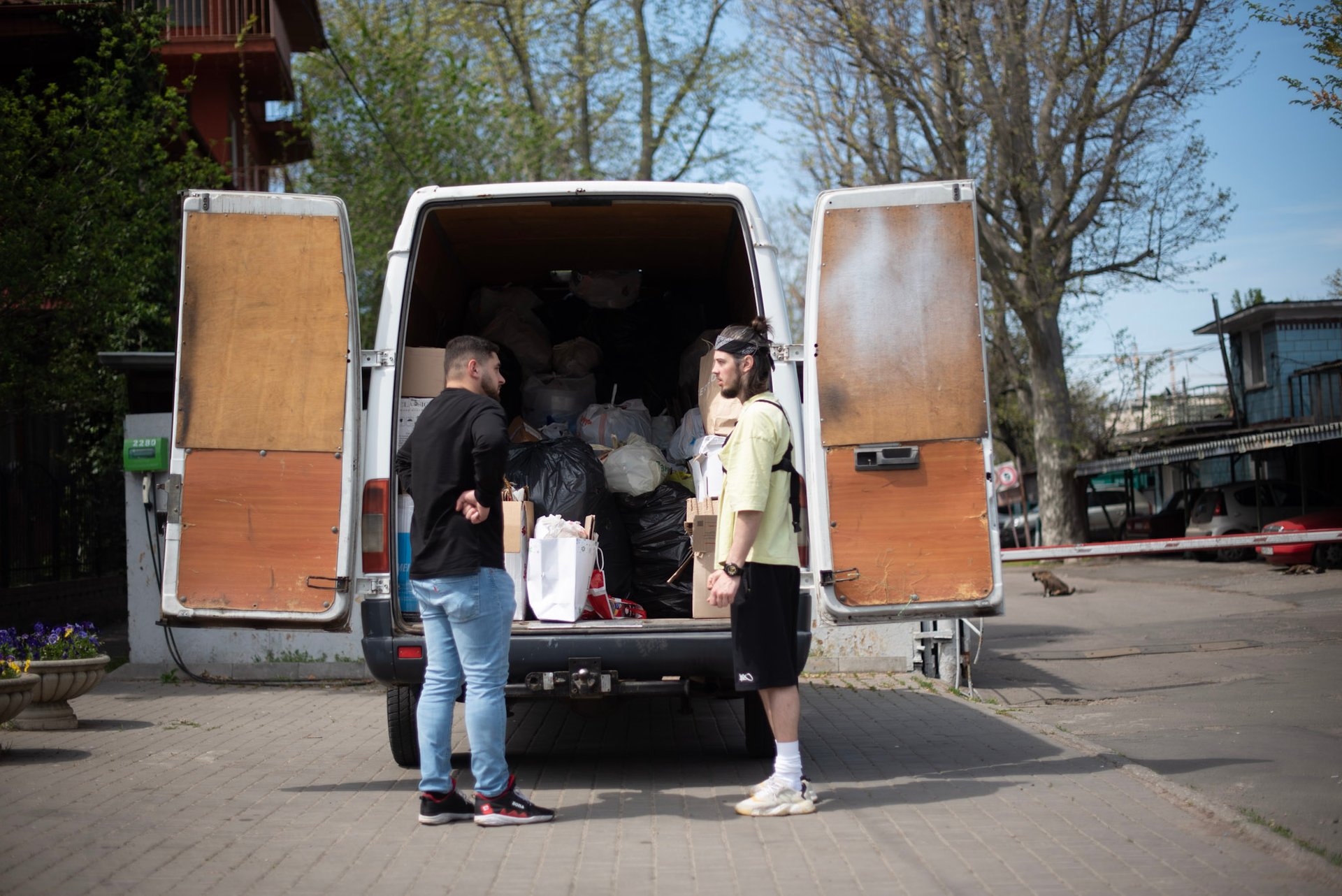
Eco-Taxi in Odesa. Photo: thefuturecity.com.ua
Eco-Route and Eco-Taxi are two initiatives in Odesa that help residents recycle sorted household waste, filling the gaps in the city's waste management system. Eco-Route operates once or twice a month at predetermined locations; dates are announced in advance on social media. People can drop off clean, dry, compressed, and sorted materials such as PET 01, HDPE 02, glass, paper, cardboard, aluminum cans, and other metals for free.
Eco-Taxi is a paid service where organizers collect pre-sorted waste directly from people's homes at a scheduled time. The initiative has been running for over six years, helping to make waste sorting a habit among Odesa residents.
Kharkiv and Kyiv regions: sorting demolition waste
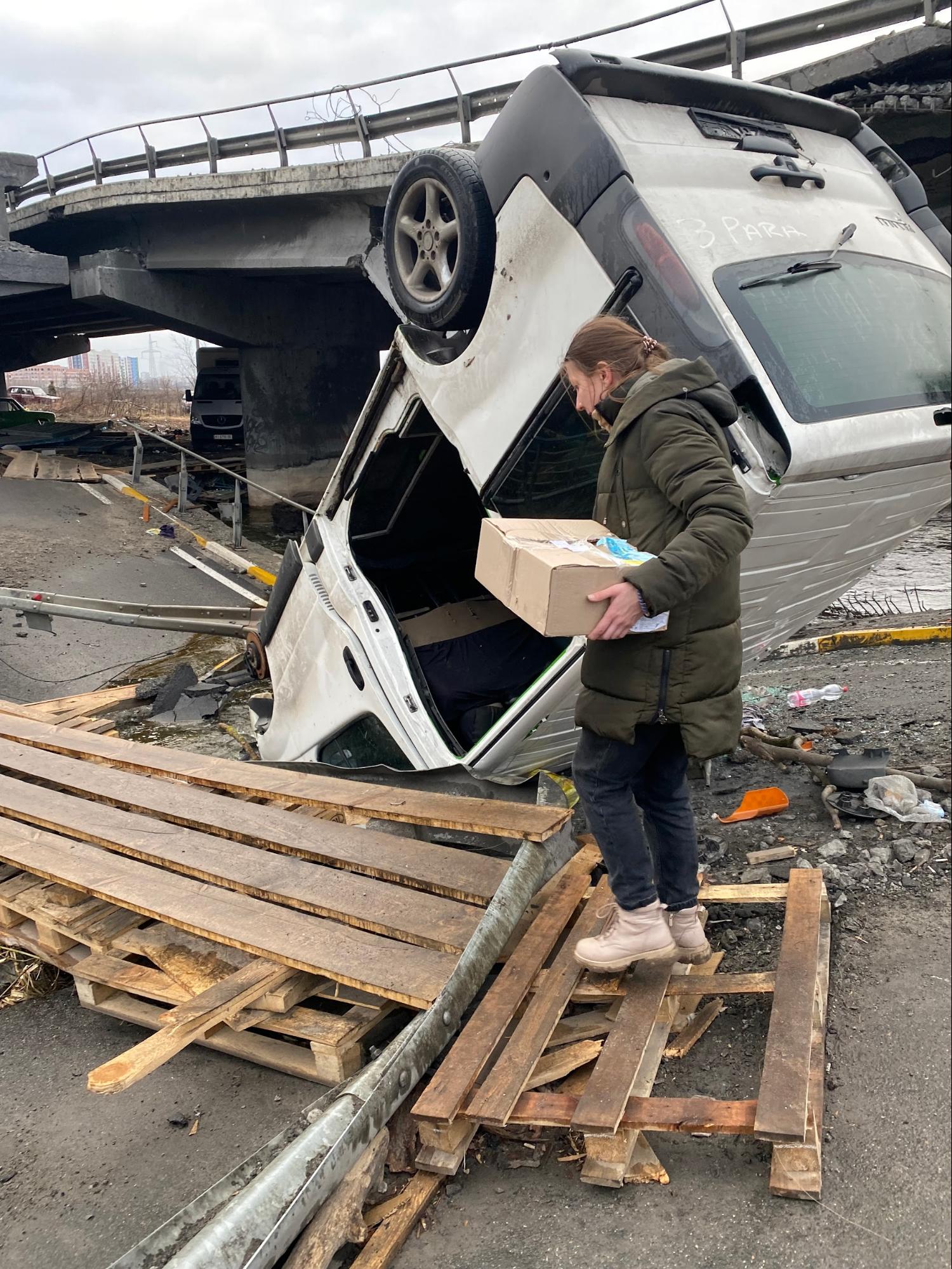
The consequences of Russian occupation and military operations in Irpin. Photo courtesy of Let's Do It Ukraine
Municipal services in major cities like Kharkiv and Kyiv collect construction debris by setting up separate containers for different materials — metal, plastic, slate, and more. However, as environmental activist Yuliia Markhel points out, household-level sorting is still rare.
Residents often in smaller towns and rural communities across Kharkiv and Kyiv regions clear the rubble themselves. Materials like bricks, concrete, and wood are repurposed for practical needs — filling potholes, repairing buildings, or even heating homes. People in villages have become more inclined to sort waste since they rely on their resources and try to minimize the cost of waste disposal.
For example, residents of the Derhachi community in the Kharkiv region collect household waste manually. The community has also set up an organic waste management system: fallen branches and trees are processed into heating fuel.
Kherson and Donetsk regions: Zero Waste Cities in Ukraine
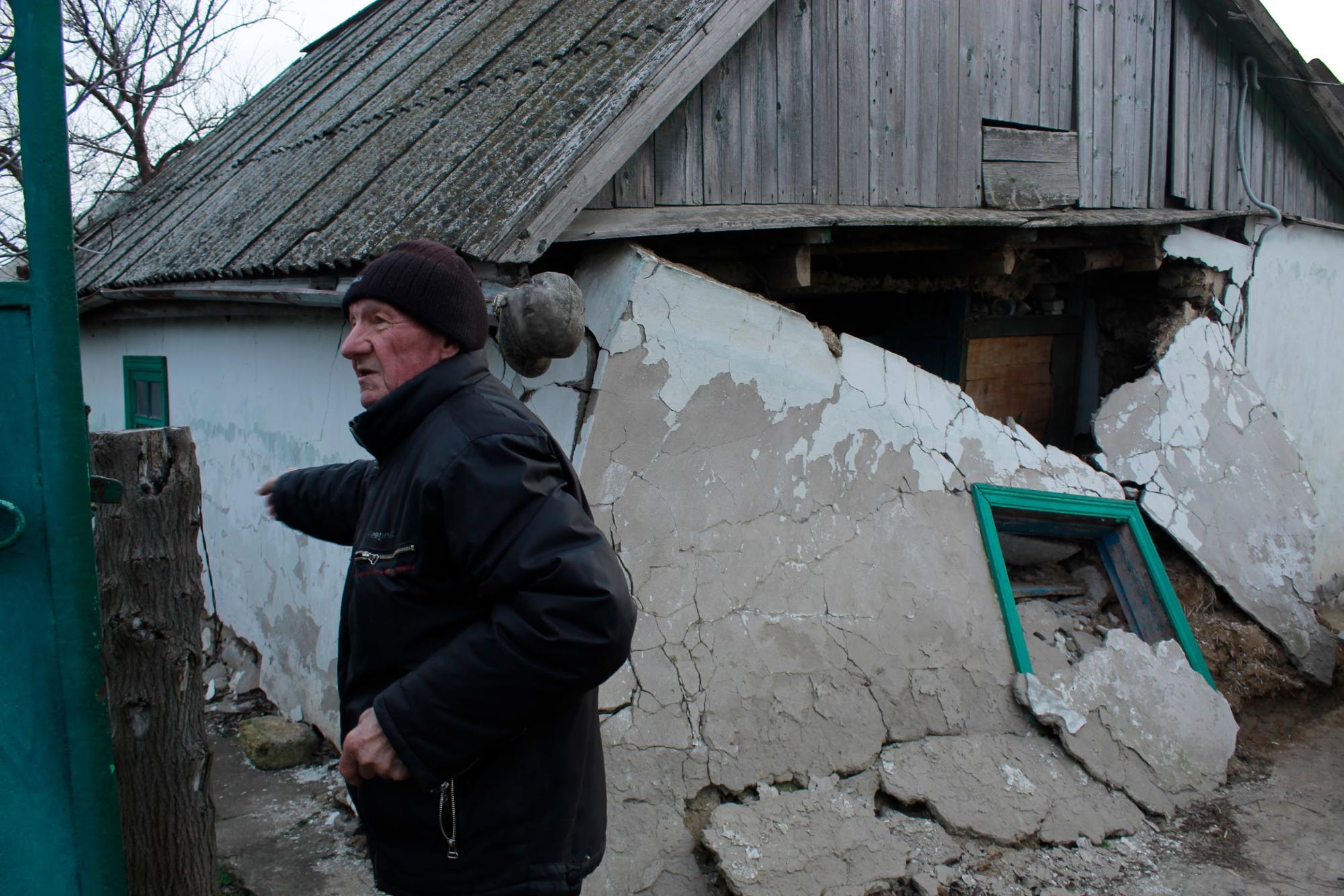
The aftermath of the Kakhovka dam destruction in the Kherson region. Photo courtesy of Let's Do It Ukraine
Due to their proximity to hostilities, the Kherson and Donetsk regions face even more challenges. Here, debris is cleared quickly to restore access to transport and temporarily secure buildings, but waste sorting is not a priority. In some communities, especially after flooding, construction waste piles up, leading to illegal dumps that harm the environment.
Despite these difficulties, some local governments and volunteers are trying to manage waste and ensure at least minimal sorting and disposal.
Rubryka has previously reported on how the front-line city of Kherson continues its waste management despite the war. The city's municipal company, EKOPOLIS, has begun conducting the first-ever waste composition testing for the Kherson community. This project is supported by a Zero Waste Alliance Ukraine educational program under the Zero Waste Cities in Ukraine initiative.
Meanwhile, the Pokrovsk community in the Donetsk region is also part of this project. Despite the war, the community has continued sorting waste, which they started to do in 2016. In 2024, with support from the regional administration, Pokrovsk acquired large waste containers and specialized transport to remove waste.
Chernihiv, Ternopil, and Chernivtsi regions: reused solar panels for communities
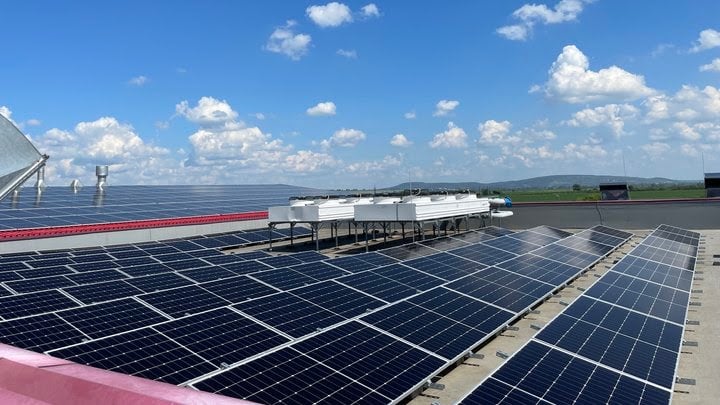
Solar panels. Photo: Suspilne Chernivtsi
The environmental organization EcoClub, based in Rivne, has partnered with the Czech NGO NESEHNUTÍ to secure second-hand solar panels for five communities in the Chernihiv, Ternopil, and Chernivtsi regions. These panels now provide energy for schools, hospitals, water facilities, and other important public spaces.
Rivne: first applications for heat pumps
Two housing cooperatives in Rivne have become the first in Ukraine to apply for heat pumps under the GreenDIM program. This initiative will provide residents with hot water and significantly reduce energy costs. The Energy Efficiency Fund will cover up to 70% of the project's cost. The cooperatives also plan to install solar panels to power the heat pumps and meet other shared building energy needs.
Even more helpful solutions
Yuliia Markhel from Let's Do It Ukraine believes that even under difficult circumstances, local authorities, volunteers, and businesses can unite to enforce waste sorting, composting, reuse, and other sustainability practices supporting Ukraine's recovery. By working together, Ukrainians can build a stable future and rebuild the country with environmental and social responsibility at its core.
Meanwhile, Sofia Sydorenko from Zero Waste Alliance Ukraine says communities today must rethink their waste management systems to prevent waste from being generated in the first place. The next step is to plan how to use available resources (money, people, and time) in the most effective and economically sound way.
To achieve this, communities need to:
- Assign responsible individuals at the community level and, ideally, create a dedicated department or team to manage waste.
- Assess the current waste management system, identifying the types and amounts of waste being generated, the dominant materials, the existing infrastructure, its condition, and where waste is produced, stored, and disposed of.
- Engage stakeholders and build communication, bringing together local authorities, municipal services, waste collection companies, recycling businesses, housing associations, NGOs, research institutions, and entrepreneurs. Effective collaboration with these groups is key to achieving real and lasting change at the local level.
We created this article as part of the Recovery Window Network. For more information on the recovery of war-affected regions in Ukraine, visit recovery.win


